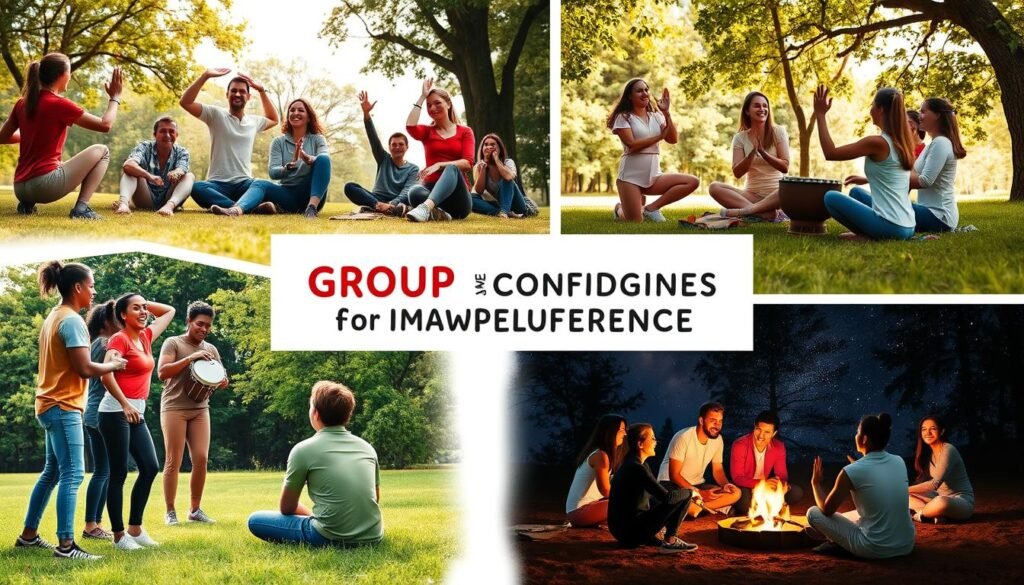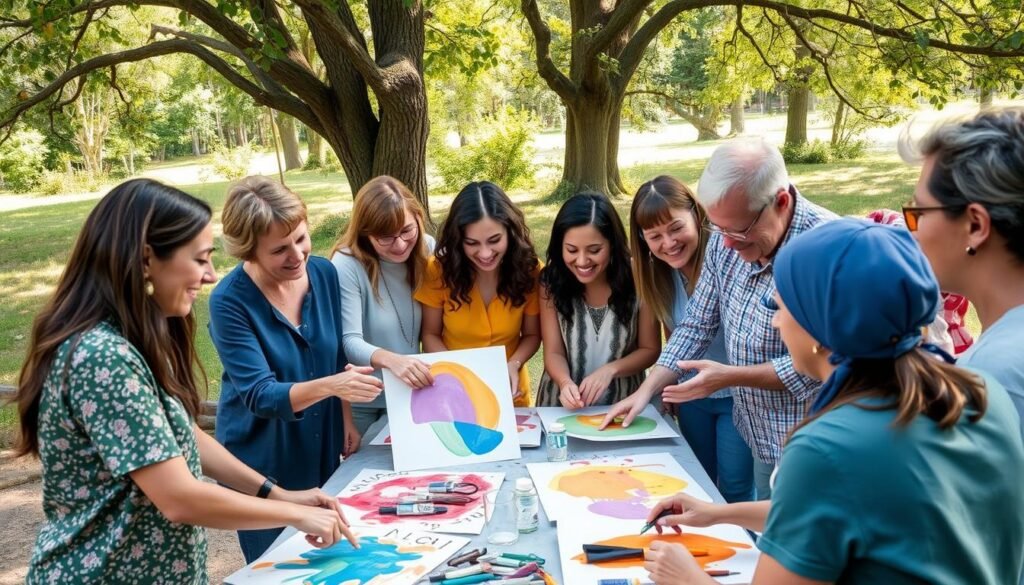Did you know about 70% of people battle with negative self-talk? This can really impact someone’s self-esteem and mental well-being. With so many wrestling with these feelings, it’s clear why some feel not good enough, leading to anxiety and wanting to be alone. Yet, joining in on group activities can create huge positive changes. It helps build confidence by connecting with others in meaningful ways.
Taking part in community events and workshops boosts your ability to interact with others. It also offers support while you face personal issues. These group settings create a feeling of belonging. This is key in dealing with anxiety and boosting confidence. Learning how to handle social anxiety is vital. This includes methods like mindfulness and getting used to speaking in public. To learn more, check out this link on how taking part in the community can improve mental health: boosting mental health through social engagement.
Key Takeaways
- Group activities are key in growing self-assurance and lessening anxiety.
- Negative self-talk is a big obstacle for many, affecting about 70% of us.
- Learning to cope with social fears using mindfulness is crucial.
- Being social helps develop important skills in dealing with others.
- Getting involved in groups can make feelings of being alone much smaller.
- Events in the community help with practicing public speaking.
Introduction to Group Activities and Their Benefits
Group activities are key for building confidence and managing anxiety. Working together helps people get better at interacting, which strengthens relationships and fosters growth.
Studies show that group projects help students learn and remember more. This comes from breaking down tasks and working through ideas together. It boosts communication and makes everyone more accountable, offering strong emotional support.
When tackling complex issues, group activities let everyone share their unique viewpoints. This leads to creative solutions. Teachers see different ways students solve problems, enriching the learning process.
Team-building exercises are also crucial in the workplace. They improve how well people work together, leading to happier employees.
These activities make communication better and help align everyone’s goals. By investing in team building, companies create stronger bonds and achieve more success. This is good for both the individuals and the group.
Understanding Anxiety and Its Impact
Anxiety is common among all ages, especially school-aged kids. It’s important to learn about understanding anxiety early on. This issue can lead to feelings of isolation. It can prevent people from going to school or doing well at work.
Many don’t seek help because of the stigma around mental health. Or, they might not have access to resources. This can make emotional problems worse. It’s important to understand both the physical and emotional effects of anxiety. This helps create a supportive space for everyone.
Anxiety often comes from a big fear of social situations. But learning how to get support can help a lot. Doing things with others can be good for people with anxiety. To find ways to manage, one can try to face negative thoughts and practice mindfulness. Using realistic goals and bettering social skills can help too. For tips, check out this resource.
Building Confidence Through Group Activities
Group activities are a great way to build confidence. They let you interact with others in a team setting. This improves self-esteem and growth.
Importance of Social Interaction in Confidence Building
When we connect with others, it helps build our confidence. Feeling accepted is key to believing in our own value. Positive group interactions reduce stress and anxiety.
Bonding activities enable us to share openly, feeling supported and valued. Recognizing each other’s strengths boosts morale. Sharing successes shows our worth.
Role of Group Dynamics in Reducing Anxiety
Being part of a group helps lessen anxiety. It gives a space to explore feelings with support. Studies show that group activities raise confidence and willingness to participate.
Teaming up allows for safe risk-taking. It helps in tackling anxiety. Tasks like problem-solving enhance teamwork and social skills. These are crucial for success in life and work. To dive deeper into confidence-building group activities, check out this informative site.
Types of Group Activities for Enhanced Confidence
Exploring different group activities can really help boost confidence. By taking part in activities that focus on teamwork and self-improvement, people feel more supported. This positive atmosphere helps everyone involved.
Teambuilding Exercises: Strength in Numbers
Teambuilding exercises are crucial for building strong relationships and achieving goals together. They make participants feel united and valued. This feeling of togetherness boosts self-esteem and confidence.
Teambuilding brings many advantages, like:
- Improved communication skills
- Increased trust among team members
- Opportunities for problem-solving
- Recognition of individual strengths
Through these activities, ties within a group become stronger. They also help create a better work climate. Happy employees are more likely to stay with a company and excel in their roles.
Self-Esteem Workshops: Fostering Positive Self-Image
Self-esteem workshops are key for individuals to discover and showcase their abilities. These sessions involve reflecting on personal strengths, setting goals, and practicing optimism. This leads to many benefits, such as:
- Greater self-awareness
- Enhanced personal growth
- Stronger social skills
- Increased feelings of worthiness
In these workshops, sharing personal stories helps build a supportive community. This further boosts confidence. Workshops prove that feeling recognized and supported enhances self-esteem greatly.

| Activity Type | Benefits | Impact on Confidence |
|---|---|---|
| Teambuilding Exercises | Collaboration, Trust Building, Problem-Solving | Increased Confidence through Support |
| Self-Esteem Workshops | Self-Reflection, Goal Setting, Positive Self-Talk | Boosted Self-Worth and Confidence |
How Leadership Development In Group Settings Boosts Confidence
Leadership development in groups creates an environment that boosts confidence. Here, individuals take on different roles and grow. They learn how group interactions work, which helps them grow personally. By understanding these dynamics, they can better meet the group’s goals.
Understanding Leadership Roles in Groups
Recognizing varied leadership roles in groups can lift confidence. Matching tasks to individuals’ strengths boosts their motivation and skill. This link between leadership roles and team success shows how good leadership development helps a team’s performance.
- Providing access to training and courses leads to better employee engagement.
- Gradually delegating tasks increases competence and boosts self-assurance.
- Supporting team members emotionally enhances their confidence levels.
- Encouraging a culture of learning from failures promotes experimentation and contribution.
| Impact of Leadership Development | Statistical Insight |
|---|---|
| Engagement Level of Employees | Only 36% of employees are engaged at work. |
| Employee Turnover Intentions | 1 in 4 Americans plan to look for new jobs post-pandemic. |
| Feeling Heard in the Workplace | 86% of employees feel they are not heard fairly or equally. |
| Benefits of Team-Building | Improved conflict resolution and trusting relationships among coworkers. |
Creating a supportive space where feedback and encouragement are key can build confidence through leadership development in groups. This kind of atmosphere pushes individuals to embrace challenges, forming a motivated and unified team.
Enhancing Communication Skills Through Interactive Learning
Group activities help people get better at enhancing communication skills. These activities make it easier to share thoughts and feelings. By practicing in different settings, people get better at choosing their words, tone, and overall language.
These activities are not just about talking. Body language, facial expressions, and gestures matter a lot. By working with others, people learn how to use these non-verbal cues. This creates a great environment for learning.
Being a good listener is also crucial for communication. By really listening and showing interest, people learn to understand other viewpoints. Active listening is key for empathy, helping build trust and closer relationships.
There are many social skills games designed for different learners. These include role-playing and team activities. These games help improve communication skills and make relationships stronger.
Finding the right activities is important. They should be suitable for the age group and help achieve specific goals. Joining clubs with similar interests is a good way to develop these skills. This happens in a supportive space.
| Skill | Description | Benefits |
|---|---|---|
| Active Listening | Engaging fully in conversations | Improved understanding and connection |
| Empathy | Understanding and sharing others’ feelings | Stronger relationships and trust |
| Non-Verbal Communication | Using body language and gestures | Enhanced message delivery |
| Role-Playing | Practicing communication scenarios | Improved adaptability and strategy |
Through group activities, people become better at communicating. They become more confident and learn important social skills. These skills help both in personal and work life.
The Power of Collaborative Problem-Solving in Group Activities
Collaborative problem-solving is essential in group activities. It allows people to combine their ideas and skills to meet common goals. This approach strengthens team cohesion and builds trust among members.
As group members collaborate, they learn to value different viewpoints. This leads to deeper discussions and better results.
Building Team Cohesion and Trust
Collaborating helps create an environment ripe for trust building. By working on challenges together, a base of reliance forms among participants.
This foundation grows through open talks and positive feedback. Everyone feels important and respected. Collaborative problem-solving leads to many benefits:
- Enhancing problem-solving skills
- Fostering social interaction
- Promoting diversity
- Improving communication skills
- Inspiring creativity
- Building trust
- Boosting confidence
- Encouraging commitment
- Fostering enjoyment
- Cultivating critical thinking skills
Modern technology has made collaboration in groups even stronger. Tools like EducateMe, Canvas, and Microsoft Teams help a lot. They let students share ideas and work together easily.
Group activities often lead to new friendships and stronger bonds, boosting morale. Studies show that collaboration helps with learning and self-confidence. Well-structured groups are more cohesive and willing to work together.
Overall, collaborative problem-solving improves social skills, confidence, and problem-solving. With the right setup and attitude, groups can achieve impressive things. They create a supportive, fun environment for everyone.
| Benefits of Collaborative Problem-Solving | Description |
|---|---|
| Enhanced Problem-Solving Skills | Participants learn to approach problems from multiple angles, leading to innovative solutions. |
| Social Interaction | Working in groups fosters relationships, encouraging camaraderie among participants. |
| Diversity Promotion | Different backgrounds bring unique perspectives, enriching discussions and outcomes. |
| Improved Communication Skills | Teamwork necessitates clear expression and active listening, honing communication abilities. |
| Inspiring Creativity | Collaboration can spark creative ideas that may not arise in isolation. |
| Building Trust | Trust develops as team members rely on each other and share responsibilities. |
| Boosting Confidence | Participation leads to higher self-esteem as individuals contribute meaningfully. |
| Encouraging Commitment | Group activities promote a sense of ownership over shared tasks and goals. |
| Fostering Enjoyment | Collaborative efforts can make tasks more enjoyable and satisfying. |
| Cultivating Critical Thinking Skills | Engaging in discussions promotes analysis and evaluation of ideas. |
Emotional Intelligence Coaching as a Confidence Builder
Emotional intelligence coaching is key to boosting confidence in groups. It teaches people to know and handle their feelings. This coaching is important for building confidence. With it, people learn to deeply get emotions, their own and others’. This knowledge helps with communication. It makes relationships in groups better too.
Understanding Your Emotions in a Group Context
In group activities, this coaching helps you deal with your feelings. Knowing what triggers emotions improves self-awareness and control. This leads to a better atmosphere for everyone. It helps people talk and connect with confidence. When you understand your feelings, you can understand others better. This makes the group stronger.
Companies that focus on emotional intelligence see better teamwork. Their teams are built on trust and connections. People in these teams support each other. And they need less effort to connect emotionally. Coaching in emotional intelligence teaches key skills. These skills help with the challenges of today’s workplaces.
Learning about emotions gives people insight. They understand how feelings influence actions and choices. This understanding brings personal and work growth. Being aware of your emotions makes joining in group work easier. You feel safer sharing your thoughts.

Social Confidence Building Through Group Interaction
Group activities are key for building social confidence. By doing things together, people connect and help each other face their fear of being judged. This makes a space where everyone can freely share their thoughts and feelings.
Overcoming Fear of Judgment
Fear of being judged can make it hard to talk and connect with others. Group activities offer a safe space to tackle this fear. In these groups, people can open up and get positive feedback. This sharing shows that everyone has doubts, promoting growth and understanding among members.
Creating Supportive Environments
Creating a supportive space is essential for social confidence. These places let people improve without worrying about others’ opinions. They encourage talking and celebrate small wins. By working together, everyone feels important and strong. For tips on handling anxiety, learn about treatments withmedication insights.
Facilitation of Group Dynamics for Anxiety Management
Effective facilitation is key in managing anxiety within groups. Skilled leaders create environments that boost engagement and target individual anxieties. This helps everyone feel comfortable and promotes personal growth. They use key strategies like setting clear guidelines and actively listening. These efforts make each person feel important, helping them deal with anxiety better.
In group therapy, different activities help lower anxiety and boost confidence. Activities like icebreakers and trust exercises create a welcoming space. These actions improve how well people communicate and trust each other. Studies show that about 78% of people feel they belong and see positive changes by sharing experiences. This highlights how group dynamics aid in mental health.
Leaders must tailor activities to meet everyone’s needs. Psychoeducational sessions can shift negative thinking, fostering cognitive change. Being in a supportive group helps lessen the impact of stress. This leads to more emotional resilience and self-awareness. Many say they find relief and healing by openly sharing their feelings.
Adding automation tools for documentation can improve group therapy. It lets leaders focus more on interacting with participants than on paperwork. Emphasizing good group dynamics, anxiety management, and smart strategies boosts people’s interpersonal skills and confidence. To learn more about group therapy for anxiety, visit this helpful resource.

Conclusion
Group activities play a key role in building confidence and reducing anxiety. When we join structured activities, we make important connections. These connections are key to improving our social skills.
Sharing experiences in these groups allows personal growth. This growth leads to better mental health.
Getting involved helps us feel like we belong. It also makes us brave enough to set goals we can reach. Acknowledging our successes, even the small ones, is crucial.
It makes us see ourselves in a better light and helps us keep going when things get tough. These are the skills we need to overcome life’s hurdles.
Are you an educator or a leader wanting to help others become more confident? Everyday Speech World has plenty of resources. They have tools and activities that encourage speaking up and learning.
By using these methods, students build confidence. This lets them face the future with courage and clear vision.